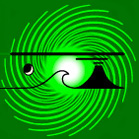963
WTPZ42 KNHC 242044
TCDEP2
TROPICAL STORM FRANK DISCUSSION NUMBER 13
NWS NATIONAL HURRICANE CENTER MIAMI FL EP072016
300 PM MDT SUN JUL 24 2016
Some impressive changes have occurred with Frank in the last several
hours. The cloud structure has evolved from a sheared pattern into
a more banded central dense overcast configuration. A 1911Z GPM
microwave pass shows the development of a sharp hooking feature,
indicative of a notable increase in organization. ASCAT data caught
the eastern side of the circulation, with 55-kt maximum winds. Due
to the low bias of the instrument at that intensity and the
increasing inner-core structure, the initial wind speed is set to
60 kt, near the TAFB classification.
The shear appears to have abated enough to allow Frank to intensify,
and Frank is now forecast to become a hurricane before reaching more
marginal water temperatures. The bulk of the guidance is also
showing a similar solution, although the COAMPS-TC and the GFDL do
not show any further strengthening. Frank is expected to become a
remnant low in 3 to 4 days while it moves over cool 23 deg C waters.
The latest NHC intensity forecast is raised from the previous one,
close to a blend of the SHIPS and LGEM models, with a bit more
weight on the latter model.
Frank has slowed down and turned westward recently according to the
microwave data, although a longer term motion is still
west-northwestward at about 5 kt. While a ridge to the north of the
storm should steer Frank generally westward to west-northwestward
for the next few days, there is a big difference emerging in the
latest guidance on what happens thereafter. It seems like the track
forecast is closely related to the depth and intensity of the
cyclone, with a stronger storm probably more likely to take a
west-northwest or northwest track at long range like the new ECMWF
model. Conversely, a weaker system would likely turn to the
west-southwest, as shown by the GFS and its ensemble. Few changes
are made to the forecast on this cycle since the model consensus has
not moved much, but it would not be surprising to see a northward
trend in the forecast if Frank becomes a stronger and deeper
cyclone.
FORECAST POSITIONS AND MAX WINDS
INIT 24/2100Z 20.0N 112.8W 60 KT 70 MPH
12H 25/0600Z 20.2N 113.5W 65 KT 75 MPH
24H 25/1800Z 20.5N 114.6W 60 KT 70 MPH
36H 26/0600Z 20.7N 115.7W 55 KT 65 MPH
48H 26/1800Z 21.0N 117.1W 50 KT 60 MPH
72H 27/1800Z 22.1N 120.1W 40 KT 45 MPH
96H 28/1800Z 22.8N 122.7W 30 KT 35 MPH...POST-TROP/REMNT LOW
120H 29/1800Z 23.0N 125.0W 20 KT 25 MPH...POST-TROP/REMNT LOW
$$
Forecaster Blake
Return to the Tropical Systems Page for FRANK
Back to main Tropical Weather page
This page is maintained voluntarily by the MKWC and the UHMET faculty, staff, and students.
It was last modified on: Thu, Jul 23 2020 - 2003 UTC
Send comments to: Ryan Lyman
|







